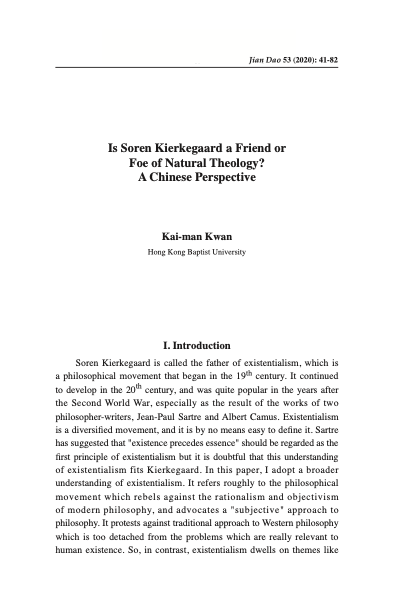Is Soren Kierkegaard a Friend or Foe of Natural Theology? A Chinese Perspective / Kai-man Kwan
Kai-man Kwan
ABSTRACT
Kierkegaard is called the father of existentialism, & existentialism tends to emphasize the irrational side of man. Kierkegaard talks about truth as subjectivity and faith as intense embracing of objective uncertainty. For many people, he is obviously a foe of natural theology. However, this paper will argue that Kierkegaard’s work as a whole, regardless of his original intention, is not in fact inimical to the project of natural theology, especially for a Chinese mind, which has a more holistic understanding of reason and experience. We are also open to the possibility that “subjective” experiences from our heart, e.g., moral experiences, can reveal the nature of the universe.
I first argue for a less extreme interpretation of Kierkegaard, & then show that the Chinese Traditions are in fact congenial to the idea of the subjective way to truth. I further defend this approach by arguing that human experiences should also be treated as evidential data. Then I outline the Anthropological Argument for God, using human experiences as evidence. I conclude that both Kierkegaard & the Chinese traditions converge on the legitimacy of the subjective way to truth, & it is not just compatible with natural theology, but can also contribute to the cumulative case for God.
撮要
祈克果被稱為存在主義之父,而存在主義比較重視人非理性一面。祈克果提倡「主體性是真理」和「信心就是熱情地擁抱客觀的不確定性」等理念,因此,很多人都認為他是自然神學的敵人。然而,本文會論證祈克果的整體作品(無論他原來的意圖為何),其實並非與自然神學水火不容。特別對中國傳統而言,我們對理性和經驗都有更整全的理解,我們也對主體經驗(如道德經驗)能揭示實在真相的可能性,持開放的態度。
我首先會提出對祈克果一個較溫和的詮釋,然後指出中國傳統與尋找真理的主體進路是吻合的。我論證人類的主體經驗也應該視作證據,接着在這些經驗的基礎之上,勾劃支持上帝的人類學論證。我的結論是,祈克果與中國傳統不謀 而合,都維護尋找真理的主體進路的合法性。這種進路不單沒有與自然神學矛盾,更能對支持上帝的累積論證作出貢獻。
原載於《建道學刊》53期(2020年1月),頁 41-82。
Latest Articles
新手牧者研究計劃(三):新手牧者的身心靈狀態 / 盧慧儀
2025 年 11 月 19 日
個體與關係:滕近輝思想中「深化」的靈性觀 / 倪步曉
2025 年 11 月 18 日
香港九龍塘基督教中華宣道會之起源和發展史/陳智衡
2025 年 10 月 20 日
Highlights
[電子書]困境與抉擇:「建道研究中心30週年誌慶」跨學科研討會論文集/廖炳堂、倪步曉主編
2025 年 1 月 2 日
從梧州到長洲:建道神學院125年的挑戰與恩典 / 陳智衡
2023 年 10 月 1 日
微小教會的見證/高銘謙
2023 年 6 月 1 日







